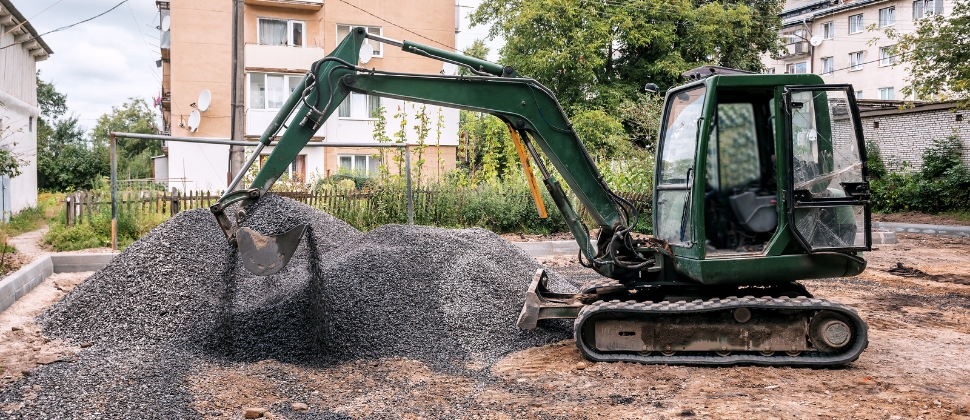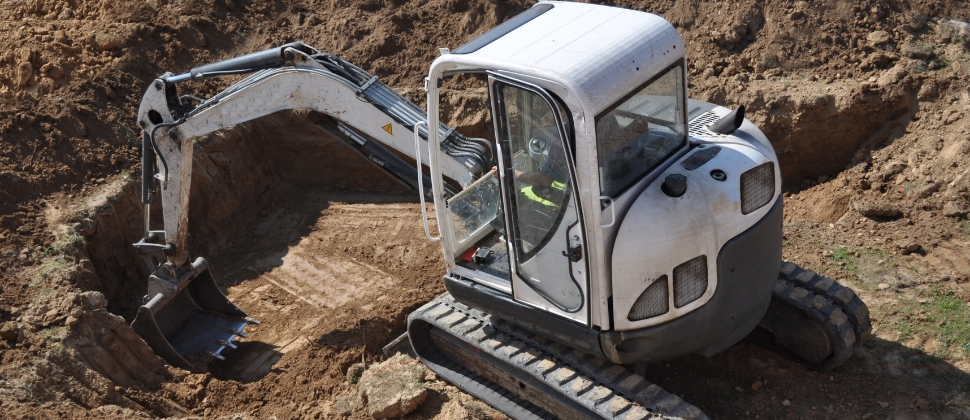Everything You Need To Know About Mini Excavators
Compact excavators, usually called mini excavators, are well known for their portability and versatility and are widely used. Mini excavators are commonly utilized for various projects including road construction, building parking lots, and other projects. Mini excavators are easy to use because they are incredibly user-friendly, easy to operate and save contractors money and time. The main introduction of mini excavators to the construction sector can be considered a revolution. Mini excavators have become very popular in the building sector and other industries. In many ways, they’re efficient options to reduce operating costs and deliver measurable values.
What are Mini Excavators?
A mini excavator is a multipurpose tool frequently used in building projects. It is more compact and lighter than a standard excavator and capable of efficiently carrying out several crucial tasks. The primary parts of mini excavators typically include a cab, engine, house, undercarriage, stick, and blade.
Mini-excavators are relatively small hydraulic excavators valued mainly for their capacity to operate in closed areas where larger excavators cannot. They are a highly well-liked piece of portable equipment and have many uses. Numerous more names for the mini excavator occur, such as small excavator, mini digger, mini hoe, and compact excavator. Whatever you call this equipment, the mini excavator is enough to perform any kind of precise digging.
Basics of Hydraulic Mini-Excavator Machines
A mini excavator’s motion and functionality depend heavily on hydraulics. The Boom, slew, attachments, and propulsion are all the essential components of hydraulic. Track drives, final drives, or drive motors are hydraulic motors that move the tracks.
Key Industrial Applications Provided by Mini Excavators
Mini-excavators are replacing backhoes and other larger machines because they are so versatile and compact. Additionally, compared to any other piece of heavy equipment in the market, mini excavators contribute the power to perform tasks much more smoothly, quickly, effectively, and efficiently. Because of their broad range of connection options, these small excavators can be used in various industries, including agriculture, forestry, mining, landscaping, and construction. You can also use this equipment for construction, farming, landscaping, materials handling, maintenance, and utility work.
Specifications of Mini Excavators
Their power rating, arm force, maximum dig depth, loading height, cutting height, and dump height are typically described.
The gross engine power is referred to by the power rating. The term “maximum dig depth” refers to the depth the bucket’s tip can dig below the mini-excavator or how deep it can dig. The opposite is true for the maximum cutting height; it specifies how high the bucket’s tip can reach. Plus, the maximum cutting height and the maximum loading height are similar.
Common Jobs for Mini Excavators
Mini excavators are used for stump removal, light demo, material handling, job site projects, or landscaping. These small excavators are frequently utilized for smaller construction and landscaping jobs because of their capabilities. These also consist of:
- building swimming pools and hot tubs
- demolition of small structures
- fixing sewage lines
- harvesting trees
- cemetery digging
- renovations to homes
- landscaping projects
- applications for the highway

Mini Excavators offer Multi-Functionality and High Productivity as Compared to Backhoe Loaders
Compared to backhoe loaders, mini excavators have several benefits. They have almost no turning radius and are built to be able to swing 360 degrees. Mini excavators have much lower purchase and operating costs than backhoe loaders. Mini excavators can work quickly and with minimal fuel to complete any operation, whether digging, trenching, or filling. They can also be equipped with several attachments to perform various tasks.
Let’s examine some of the essential benefits of using mini excavators:
- Easily Transported:
One of the main concerns when renting equipment is moving the machinery from one location to another. Larger machines are more difficult to transport and more expensive to move around. Mini excavators can fit easily and are easier to move because of smaller machines.
- Quieter:
Most of these excavators are made to be quieter. Compared to larger excavators, they produce much less noise as they cross cement and hard surfaces. Such things make them perfect for working on residential projects.
- Easy to Use:
Mini excavators are simple to use and require only a few minutes to learn. However, anyone can use this mini excavator equipment and start immediately.
- No Limit to Functionality:
Similar to full-sized excavators, mini excavators operate. Its functioning is unlimited by its size. Because they can swing 360 degrees, you don’t need to move dump trucks to suit the excavator’s location.
- Versatility:
Mini excavators can be fitted with various excavator connections, whether used for building or demolition. These include buckets, rippers, augers, compactor plates, and many more. Due to its versatility, the equipment can be used for various tasks, saving time and money.
- Save You Money & Time:
Using a mini excavator can help you save a lot of time as well as money. To begin with, they are more cost-effective than a regular excavator. So, if you are purchasing a new or a used excavator for sale, you will need to spend less. However, there are more ways the equipment can help you save money. For example, you can transport the machine through the highway without spending money to get a special permit. Additionally, mini excavators can save a lot of money on fuel and maintenance.

Here are the Benefits of a Mini Excavator’s Compact Size
Of course, an excavator’s smaller size has benefits, especially if you frequently complete projects where a full-size excavator is excessive. Below, we’ve listed some of the benefits of a mini excavator’s compact size. Let’s have a look:
-
- Generate less noise than full-size excavators.
- Reduce operational costs because it consumes less fuel and other fluids
- Compared to their larger counterparts, they create less burden on storage and transportation.
- Compact excavators are much more flexible and manageable in tighter work environments than bigger machines.
- Boost efficiency and productivity when used for properly sized jobs.
- Mini excavators are easy to operate, so workers can be trained quickly without spending too much time and cost.

Mini Excavator Operating Tips
There is no doubt that a mini excavator may help you get the best performance out of your machine. However, it is critical to understand the best methods to work with your mini excavator. Take a look at some of the most important mini excavator operating tips below:
- Test the mini excavator
- Read the instruction manual
- Check the machine before use
- Ensure correct Balance
- Practice driving on Tracks
Applications of Mini Excavators
If you need to dig holes or shape a ground surface, mini excavators can handle various construction and backyard tasks. Aside from supporting larger projects with full-size diggers, they are mainly utilized for small to medium-sized projects. Where accessibility and accuracy are required, they are beneficial. Mini excavators can also be used for the following things:
- Removing tree stumps
- Destroy concrete, steel, and other construction materials
- Drainage and utility trenching
- Shaping ground surfaces
How to Find The Right Mini Excavator For Your Project
Making a plan is the greatest way to choose the best excavator for a project. Knowing exactly what role the excavator will play on a job site will help you determine what kind of excavator is needed. As a result, your work can become more effective and productive. Also, renting the correct size of equipment can be more effective for work than trying to use one piece of equipment for a variety of tasks.
Final Words:
Mini excavators are small digging machines that can be used in a variety of construction and landscaping jobs. They have become increasingly popular as they provide great mobility while still offering powerful digging and lifting capabilities. To understand their operation, it’s important to familiarize yourself with the different components and features that make operating mini excavators so easy. We hope that with our blog you have received most of the information and if required you can easily use mini excavators for your next project.
Frequently Asked Questions
How many hours is good on a used mini excavator?
Many contractors replace hydraulic excavators from primary production after around 9,800 hours of service. Most components, with the exception of the engine, have seen major repair or replacement by the time an excavator reaches that number.
Mini-excavators have a similar average lifespan of around 10,000 hours. You should pay careful attention to the undercarriage wear and track condition on both excavators and mini-excavators.
What is the best mini excavator for you?
There are numerous mini excavator models available in the market according to price and weight. But it can be difficult to decide which option is best. To help you decide, Here below are some of the top-rated mini excavators on the market.
- Best Overall: Yanmar ViO35-6A
- Best Budget Option: Bobcat E26
- Best Mini Household Excavator: Kubota K0008-3
- Best Electric Mini Excavator: Volvo ECR25
- Best Mini Excavator for Smaller Tasks: Komatsu PCO1-1
- Best Customizable Option: John Deere 35G
What is the best brand of a mini excavator to buy?
Whether you’re looking for an economical excavator option or are simply working in some tight spaces, Here below we have listed some of the top mini excavator brands for your next project.
- Kubota
- Takeuchi
- Bobcat
- John Deere
- Caterpillar
- Yanmar
- Komatsu
What can be done with a mini excavator?
Mini excavators are smaller than standard excavators, but the mini excavators can be used for small and moderate jobs. Take a look below to know the several tasks a mini excavator can do.
- Snow removal
- Digging holes
- Digging tiny holes
- Demolishing minor constructions
- Sewer line repair
- Landscaping job
- Digging of swimming pools or garden ponds
- Snow removal
What size mini excavator is best?
A 3 to 5-tonne mini excavator is the most flexible machine and the best size small excavator for many projects. A machine in this size range is a full-function small excavator that may be used for everything from stump removal to levelling a driveway or digging in a hot tub. They are appropriate for small job sites but have the might, technology and comfort of their bigger counterparts, with details such as enclosed heated and air-conditioned cabs and easy-to-use attachments.
Recommended:
▶ How Much Does A Bulldozer Weigh
▶ Discovering Melbourne’s Top Architects Here





